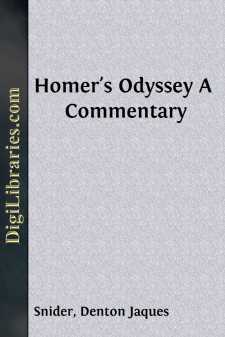Categories
- Antiques & Collectibles 13
- Architecture 36
- Art 48
- Bibles 22
- Biography & Autobiography 813
- Body, Mind & Spirit 142
- Business & Economics 28
- Children's Books 15
- Children's Fiction 12
- Computers 4
- Cooking 94
- Crafts & Hobbies 4
- Drama 346
- Education 46
- Family & Relationships 57
- Fiction 11828
- Games 19
- Gardening 17
- Health & Fitness 34
- History 1377
- House & Home 1
- Humor 147
- Juvenile Fiction 1873
- Juvenile Nonfiction 202
- Language Arts & Disciplines 88
- Law 16
- Literary Collections 686
- Literary Criticism 179
- Mathematics 13
- Medical 41
- Music 40
- Nature 179
- Non-Classifiable 1768
- Performing Arts 7
- Periodicals 1453
- Philosophy 64
- Photography 2
- Poetry 896
- Political Science 203
- Psychology 42
- Reference 154
- Religion 513
- Science 126
- Self-Help 84
- Social Science 81
- Sports & Recreation 34
- Study Aids 3
- Technology & Engineering 59
- Transportation 23
- Travel 463
- True Crime 29
Homer's Odyssey A Commentary
Categories:
Description:
Excerpt
HOMER'S ODYSSEY.
BOOK FIRST—INTRODUCTION.
The Odyssey starts by organizing itself; it maps out its own structure in what may be called a General Introduction. Herein lies a significant difference between it and the Iliad, which has simply an Invocation to the Muse, and then leaps into the thick of the action. The Iliad, accordingly, does not formulate its own organization, which fact has been one cause of the frequent assaults upon its unity. Still the architectonic principle is powerful in the Iliad, though more instinctive, and far less explicit than in the Odyssey. It is reasonable to suppose, therefore, that the poet has reached a profounder consciousness of his art in his later poem; he has come to a knowledge of his constructive principle, and he takes the trouble to unfold the same at the beginning. To be sure, certain critics have assailed just this structural fact as not Homeric; without good grounds, in our judgment.
The First Book, accordingly, opens with an Introduction which belongs to the entire poem, and which embraces 95 lines of the original text. This portion we shall look at separately in some detail, as it throws a number of gleams forward over the whole action, and, as before said, suggests the poetic organism. It has three divisions, the Invocation, the Statement of the Obstacles to the return of the Hero, and the Assembly of the Gods, who are represented as organizing the poem from Olympus. The Divine thus hovers over the poem from the first, starting with one grand, all-embracing providential act, which, however, is supplemented by many special interventions of deities, great and small.
The Invocation. The first line speaks of the man, Ulysses, and designates his main attribute by a word, which may be translated versatile or resourceful, though some grammarians construe it otherwise. Thus we are told at the start of the chief intellectual trait of the Hero, who "wandered much," and who, therefore, had many opportunities to exercise his gift. In the second line our attention is called to the real starting point of the poem, the taking of Troy, which is the background of the action of the Odyssey, and the great opening event of the Greek world, as here revealed. For this event was the mighty shake which roused the Hellenic people to a consciousness of their destiny; they show in it all the germs of their coming greatness. Often such a concussion is required to waken a nation to its full energy and send it on its future career.
Note that Ulysses is here stated to be the taker of Troy, and this view is implied throughout the Odyssey. Note Achilles is the final Greek hero; he perished without capturing the city, and in his hands alone the Greek cause would have been lost. The intellectual hero had to come forward ere the hostile town could be taken and Helen restored. Herein the Odyssey does not contradict the Iliad, but is clearly an advance beyond it.
But Troy is destroyed and now the second grand question of the Greeks arises: How shall we get back!...


